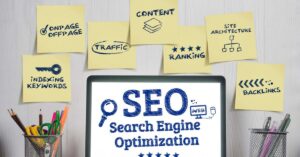SEO has always been a wild ride, and every time we think we have it figured out, Google shakes things up. Back in the day, ranking a website was almost like a magic trick—throw in some keywords, spam a few backlinks, and boom, first-page results. But today? It’s an entirely different beast, thanks to artificial intelligence running the show. AI-driven SEO is both a blessing and a nightmare, depending on how you play your cards.
At Above Bits, we’ve been navigating the twists and turns of search engine optimization for nearly two decades. We’ve seen Google’s algorithm evolve from the innocent days of keyword stuffing to an AI-driven monster that judges content like an English professor on a caffeine binge. And with AI’s increasing influence, the way we optimize for search engines has changed forever.
But is AI making SEO better or worse? Let’s dig into how AI is rewriting the rules, the tools reshaping the game, and why some businesses are thriving while others are watching their rankings plummet faster than a poorly executed TikTok trend.
The Rise of AI in SEO: A Revolution or a Nightmare?
It wasn’t that long ago when SEO experts had to rely on gut instinct and spreadsheets full of keyword data to optimize websites. Fast forward to today, and AI is practically running the show. Google’s search engine has evolved into an intelligent entity that understands what users are searching for and anticipates what they really want.
With the introduction of RankBrain in 2015, Google started leveraging AI to analyze search queries, detect user intent, and personalize results based on a person’s past behavior. This was a game-changer, making search results more relevant than ever. But it also meant that traditional SEO tricks became obsolete overnight.
Now, AI influences everything from search rankings to content creation, user experience, and even backlink valuation. A Charlotte SEO agency that isn’t keeping up with these changes practically invites its clients to vanish from search results.
Google’s AI Evolution: From RankBrain to Gemini AI
It’s not just RankBrain anymore. Google has continued its AI rampage, introducing BERT (Bidirectional Encoder Representations from Transformers) in 2019 and, more recently, the Gemini AI model, which can process text, images, and even video to determine search rankings.
BERT was designed to understand natural language better, making search results more context-aware. This update killed awkwardly structured keywords and pushed businesses toward conversational, high-quality content. But Gemini AI? That’s a whole different level.
Gemini AI uses multimodal learning, meaning it doesn’t just analyze text but can interpret entire multimedia experiences. Imagine writing a blog post, but instead of just optimizing words, you also need to consider visual storytelling, video summaries, and interactive content. AI demands richer, more engaging content—something many businesses still struggle to deliver.
For companies relying on outdated tactics, this is where things start to fall apart. Gone are the days when simply repeating “best SEO services” 100 times would land you on page one. AI isn’t just reading your content anymore; it’s understanding it, evaluating it, and deciding if it’s worthy of ranking.
AI-Generated Content: The Good, The Bad, and the Absolutely Terrible
With the rise of AI tools like ChatGPT, Google Gemini, and Jasper, businesses have mass-produced content like never before. In theory, AI-generated articles should be the ultimate SEO hack—fast, cheap, and packed with relevant keywords. But in practice? It’s been a total disaster for many websites.
Google has been relentless in its fight against low-quality AI-generated content. In March 2024, a wave of websites got deindexed overnight because they were pumping out AI-written fluff with no originality or real value. Google’s core update reinforced one thing: AI should assist content creation, not replace it.
At Above Bits, we’ve tested AI-generated content extensively. While AI is great for research, outlining, and drafting, we’ve seen firsthand how it falls short in emotional depth, humor, and unique storytelling—the very things that Google values in human-created content. A Charlotte SEO agency that blindly trusts AI to do the work is asking for a ranking penalty.
The companies that are thriving in this AI-driven SEO landscape are the ones blending AI efficiency with human creativity. AI can speed up workflows, analyze search intent, and suggest optimizations, but the best content still requires a human touch.
The AI-SEO Paradox: Why Some Websites Are Thriving While Others Tank
Here’s where things get interesting. While AI is making it easier to create content, it’s also making it harder to rank. That’s because Google’s AI is now sophisticated enough to spot low-effort, repetitive, or unoriginal material.
Think about how Netflix recommends movies. If you keep watching mindless action flicks, it’ll keep feeding you similar content. But if a new blockbuster releases and everyone watches it, that film gets promoted across the platform. Google works similarly. It prioritizes engaging, widely shared, and genuinely helpful content while ignoring content that looks automated, redundant, or keyword-stuffed.
So, what does this mean for SEO? The bar is higher than ever. Websites that succeed today are the ones focusing on:
- Engagement metrics: Time on page, bounce rates, and interaction levels.
- Expertise and authority: Google now prioritizes authors and businesses with proven credibility.
- Unique insights: Original research, expert opinions, and firsthand experience matter more than ever.
AI might be helping with SEO, but if misused, it’s also the reason why so many businesses are watching their rankings plummet.
Charlotte SEO Agencies Adapting to AI: Who’s Leading the Charge?
SEO is changing faster than ever, and not every Charlotte SEO agency is keeping up. Some agencies still rely on outdated link-building strategies, while others aggressively push AI-generated content that lacks substance.
At Above Bits, we’ve adapted by combining AI-powered research with human-driven creativity, ensuring our content remains both optimized and engaging. We also focus on ethical, white-hat SEO strategies, avoiding shortcuts that could trigger Google penalties.
With nearly two decades of experience, we’ve seen countless SEO trends rise and fall. What remains constant is Google’s preference for quality, relevance, and user-focused content. If AI is used correctly, it can enhance an SEO strategy. But if it’s treated as a shortcut, it can be the fastest way to an algorithmic penalty.
The Future of AI in SEO: Smarter, Stricter, and Less Forgiving
If the past few years have taught us anything, it’s that AI isn’t here to make SEO easier—it’s here to demand more from it. As Google’s machine learning models evolve, they’re shifting the focus away from traditional ranking signals and prioritizing user intent, engagement, and credibility.
This means that businesses can’t afford to play guessing games anymore. The SEO strategies that worked five years ago might penalize your site today. And if you think Google is done rolling out AI updates, think again.
In 2025 and beyond, we’re looking at a future where AI won’t just analyze content—it will predict and shape search behavior in ways we’ve never seen before. And for businesses that don’t keep up? Well, let’s just say they’ll be as visible as MySpace pages in 2024.
Google’s AI-Powered Search: The End of Traditional SEO?
Remember when a well-optimized page could hold a top-ranking position for months, even years? That’s not happening anymore. With Google’s Search Generative Experience (SGE), AI-generated summaries appear above traditional search results, directly answering user queries.
This is a game-changer for search. Instead of clicking on websites, users are getting their answers right from Google itself. That’s great for convenience but terrible for businesses that rely on organic traffic.
A Charlotte SEO agency that isn’t preparing for this shift is already behind. The focus is no longer just about ranking on page one—it’s about ensuring that content is featured within Google’s AI-generated results.
To survive in this new landscape, businesses must create content that AI trusts enough to include in its summaries. This means:
- Using structured data and schema markup to make content machine-readable.
- Focusing on topical authority by covering entire subject areas in-depth.
- Creating multimedia-rich content since Google AI prioritizes diverse content formats.
AI vs. Human SEO: Can You Still Win Without AI?
With AI playing such a dominant role, does that mean old-school SEO tactics are dead? Not entirely. In fact, many businesses are realizing that pure AI-driven SEO has serious limitations.
Take Google’s March 2024 update. Thousands of AI-generated websites were deindexed overnight because they lacked depth, originality, and value. Meanwhile, human-crafted, expert-driven content saw significant ranking boosts.
This tells us one thing: AI can enhance SEO, but it can’t replace human expertise. While AI can analyze millions of data points in seconds, it still struggles with nuance, storytelling, and emotional connection—three things Google heavily factors into search rankings.
At Above Bits, we use AI to accelerate research, spot SEO trends, and optimize technical aspects, but we never let AI write content without a human touch. We’ve seen firsthand how overreliance on AI leads to generic, soulless content that Google’s algorithms quickly recognize and push down the rankings.
Run if a Charlotte SEO agency tells you that AI can handle everything. Google’s AI is smart enough to detect AI-generated fluff and doesn’t reward shortcuts.
Case Study: How AI Crushed—and Saved—an SEO Strategy
Let’s talk about a real-world example of AI’s double-edged sword in SEO. In late 2023, a global e-commerce company replaced its entire content strategy with AI-generated articles. The result?
Within three months, their organic traffic plummeted by 65%, and their domain authority took a massive hit. The problem? Despite being loaded with keywords and SEO-friendly structures, Google flagged their content as low-quality and repetitive.
Desperate for a fix, they switched gears, bringing in SEO professionals who blended AI insights with human expertise. Instead of mass-producing AI content, they leveraged AI for research while human writers created in-depth, valuable, and engaging articles.
The result? Traffic rebounded by 80% in six months, and their rankings recovered and improved beyond their original standing. This proves that AI isn’t the problem—using it irresponsibly is.

The Biggest AI-SEO Pitfalls and How to Avoid Them
Despite AI’s capabilities, many businesses fall into the same traps, damaging their rankings instead of improving them. Some of the most common AI-SEO pitfalls include:
- Over-optimized AI content: Google penalizes content that feels robotic or repetitive.
- Thin, AI-generated articles: Search engines prioritize depth and expertise.
- Ignoring EEAT (Experience, Expertise, Authority, Trustworthiness): Google ranks content based on who is writing it, not just what it says.
- Relying only on AI keyword suggestions: AI can spot trends, but humans must refine them to create natural, engaging content.
The solution? Balance AI with human expertise. That’s exactly what Above Bits does when crafting SEO strategies. We don’t just chase algorithm updates—we predict where SEO is heading and adapt before the changes hit.
Charlotte SEO Agencies and the AI Dilemma: Adapt or Die
SEO agencies across Charlotte, North Carolina, face a dilemma: embrace AI fully or stick to traditional methods. The reality is neither extreme works.
Some agencies are pushing 100% AI-generated content, while others refuse to use AI at all. Both approaches fail because they ignore what Google actually wants—authentic, well-researched, and engaging content that provides real value.
At Above Bits, we take a hybrid approach. We leverage AI for:
- Data-driven keyword research
- Competitor analysis and trend forecasting
- Technical SEO optimization and site audits
But we rely on human expertise for:
- Engaging, creative content that builds trust and authority
- Strategic link-building and guest posting
- Customized SEO solutions that adapt to algorithm changes
This balance has helped us future-proof our clients’ SEO strategies, ensuring long-term growth rather than short-lived ranking spikes.

What’s Next for AI and SEO?
Looking ahead, AI will only become more integrated into search engines. But that doesn’t mean businesses should blindly trust AI to handle SEO. The best results will come from strategic human oversight, ensuring that content remains valuable, original, and authoritative.
SEO in 2025 and beyond will require a mix of AI-driven efficiency and human creativity. Agencies that find this balance will dominate search results. Those that rely on cheap AI hacks will disappear.
So, the big question is: Is your business ready for the AI-driven SEO era?
If you want an SEO strategy that adapts to Google’s AI evolution, reach out to Above Bits’ Charlotte SEO services, and let’s build something that lasts.
CLICK HERE FOR MORE BLOG POSTS











